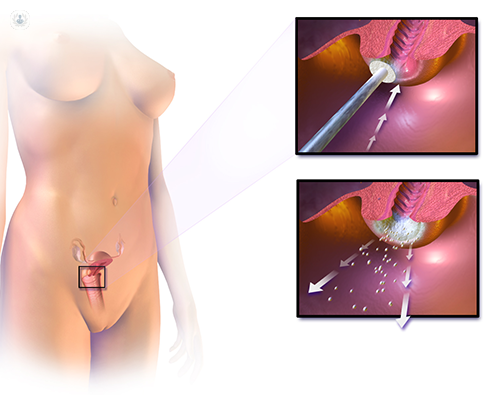


What is cryosurgery?
Cryosurgery is a type of surgery that uses freezing cold temperatures to destroy abnormal tissues such as tumours or precancerous skin lesions. In most cases liquid nitrogen is used, but carbon dioxide or argon gas can be used as well. When these are low enough temperatures, anything in contact with it instantly freezes, which when on human skin kills the cells on contact.

Why is cryosurgery done?
When treating precancerous skin lesions, by killing these cells you are preventing them from becoming cancerous. Other types of cancer than can be treated with cryosurgery include:
- Retinoblastoma
- Early-stage skin cancers
- Precancerous growths and abnormal cells in the cervix
- Early-stage prostate cancer, but this is less common than other treatments such as a prostatectomy.
- Primary liver cancer (if it has not spread)
What does cryosurgery involve?
The freezing agent is placed on the skin, for example, using a cotton swab or spray. To avoid pain or discomfort, a numbing medicine can be applied to the skin beforehand. If an internal area is being treated, a special scope with a flexible tube is used to apply the freezing agent. An ultrasound may be used to guide such treatments.
How do you prepare for cryosurgery?
Preparation will depend on the type of cryosurgery being carried out. For external treatments on the skin, little preparation is required. If internal cryosurgery is being performed, you will have instructions similar to those for traditional surgery, such as a fasting period before the procedure.
Aftercare following cryosurgery:
Cryosurgery is usually performed as a day-case procedure, meaning you can go home the same day as surgery, however, if the surgery was internal, you may be required to stay in hospital for a couple of nights. You should keep any external areas clean and change bandages frequently.
Alternatives to this treatment:
Cryosurgery is often chosen for cases that are early stage. Cancers that have spread or are in later stages will be treated more invasively with surgery and/or radiation therapy.